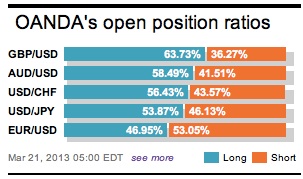A few subtle threats and a lot of red flashing are attempting to erode the single currency’s recent resilience. Russia is supposedly reconsidering the EUR in the structure of its gold and forex reserves in light of the Cyprus situation – an undertone threat in retaliation to European authorities obsession with Cypriot Russian deposit accounts.
The “Motherland” has openly criticized the “confiscating of deposit” and is worried that it could also be implemented in other weak periphery countries – were Russian investors have also considerable interest. Earlier in the week the Cypriot government rejected a controversial levy on bank deposits that was key to receiving +EUR10b rescue aid for the country. Cyprus is now seeking further financial support from Russia. Talks between the two remain constructive, but no agreement on any loans just yet.

This morning’s poor Euro-zone data will crush any hopes of economic recovery in Q1. The composite PMI for the Euro-zone fell to a four month low this month (46.5 from 47.9). However, it’s the regional data from the Euro-zones two largest economies – Germany and France – that has had a few EUR sellers trigger-happy. French headlines are beginning to diverge with Germany and converge with its neighboring peripheries. The French composite PMI has fallen to 42.1 while German PMI remains above 50 at 51. This type of data will only increase pressure on France to deliver yet again more austerity.
In Germany’s case, the markets will certainly have their doubts about the German economy having the ability to continually “shrug off the rest of the Euro-zones weakness” before having a direct domestic impact. The markets have been expecting Germany to return to growth in Q1, but other Euro-zone risks keep mounting and threaten that possibility. Germany is expected to lead the Euro-zone out of recession later this year, but with increased fiscal austerity, tighter credit and high unemployment, the Euro-zone peripheries road to recovery keeps getting longer.
The ECB has threatened to cut off emergency funding next Monday for troubled Cypriot banks if the country does not seal a deal for a bailout. Public pressure tactics like this rarely helps any situation. Cyprus has narrowing options to rescue its financial sector from collapse after international lenders rejected an alternative deal. Ongoing “gas for cash” talks with Russian have yet to yield a deal.

Sterling has found some much needed love and support from a shockingly good UK retail sales data headline (ex-fuel +1.9%, m/m and with fuel +2.1%). It seems that the UK consumer cannot be written off just yet, even if there was pent up demand from the consumer last month due to the weather.
Asia is not shy in wanting to sit this one out whilst USD/JPY and the JPY crosses remain bid. Investors are prepared wade to the sidelines, wary of the lack of developments over Cyprus. Even the Japanese fiscal year-end is limiting any substantial flow, while the country’s export sales seem to have restricted some of the USD/JPY rhetoric driven advance. China’s HSBC flash PMI was acceptable (51.7) but failed to provide any traction for risk currencies. The new BoJ head honcho, Governor Kuroda news conference is expected to shed some insight to the banks monetary policies – will authorities rhetoric match their action remains the million-dollar question.

French and Spanish debt issues this morning have come and gone and were well supported with a solid cover. Thus far the EUR has remained resilient against the dollar, however, the longer the Cypriot crisis is allowed to drag on the more investors will become nervous. The weight of the Euro bad data and Euro negative news (Cyprus and Italy’s 5-star to seek referendum on the EUR) should limit recoveries as market sentiment prefers to sell the single currency on any rally at the moment. Below 1.2880 the market is looking at a new playing field.

Other Links:
Where Is This EURO Short Squeeze?
This article is for general information purposes only. It is not investment advice or a solution to buy or sell securities. Opinions are the authors; not necessarily that of OANDA Corporation or any of its affiliates, subsidiaries, officers or directors. Leveraged trading is high risk and not suitable for all. You could lose all of your deposited funds.



